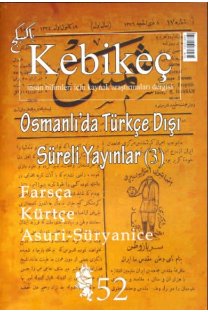Şiddet, milliyetçilik ve hak İhlâli/cürüm istatistikleri: Osmanlı Örneği
Osmanlı son yüzyılını kaplayan kollektif ve politik şiddet günümüz Osmanlı coğrafyasında da tüm yıkıcılığıyla devam etmektedir. Bu tarihsel ve güncel sorun her alanda oldugu gibi akademide de gereken ilgiye mazhar olmaktadır. Ancak bu çalışmaların pek kaale almadığı veya üstünkörü geçtiği konu kollektif şiddetin nitelendirilmesi ve ölçülmesi meselesidir. Kollektif şiddet duygusal bir kalkışmadan öte bir rasyonel aklı içeriyorsa, bunun ölçülmesi de kaçınılmazdır. Bu çalışma milliyetçiliğin şiddet/ihlâl istatistiklerini nasıl ürettiklerine, araçsallaştırdıklarına dair sorgulanabilecek genel özellikleri öne çıkarmakta ve bunlara doyurucu cevaplar aramaya çalışmaktadır.
Violence, nationalism and the statistics of violence/violations: The Ottoman case
Collective and political violence that dominated the late century of the Ottoman Empire still prevails in the same lands with its destructive consequences. This historical and actual problem deservedly receives attention in the academia. However, the issues of how to define the colective violence and how it was measured have been grossly ignored. If such violence involved a rationale behind, one would inevitably expect it to be measured as well. This essay attempts to question the main characteristics of how nationalism produced what may be called statistics of violence/violations and seeks to find some answers to such questions.
___
Anagnostopoulou, S., The Passage from the Ottoman Empire to the Nations-States, İstanbul 2004.Anderson, Benedict, Imagined Communities: Reflections on the Origin and Spread of Nationalism, Verso, 2006.
Bloxham, Donald, The Great Game of Genocide: Imperialism, Nationalism, & The Destruction of the Ottoman Empire, University Press, Oxford GB, 2003.
Bookman, M. Z., Economic Decline and Nationalism in the Balkans, New York: St. Martin's Press, 1994.
Boura, Catherine, “The Greek Millet in Turkish Politics: Greeks in the Ottoman Parliament (1908-1918)”, Ottoman Greeks in the Age of Nationalism, D. Gondicas ve C. Issawi (ed.), New Jersey: Darwin Press Princeton university, 1999, ss. 193-206.
Bourguet, M-N., Déchiffrer la France: La statistique départementale à l’époque napoléonienne, Paris: Editions des archives contemporaines, 1988.
Bozarslan, Hamit, La question kurde: États et minorités au Moyen-Orient, Paris, Presses de Sciences-Po, 1997; Robert Olson, The Emergence of Kurdish Nationalism and the Sheikh Said Rebellion 1880-1925, University of Texas Pr; 1989.
Choublier, Max, La question d'Orient depuis le traité de Berlin, Paris, Librarie nouvelle de droit et de Jurisprudence, 1899, s.372.
Cohen, P. C., A Calculating People: the Spread of Numeracy in Early America, Chicago: University of Chicago Press, 1982.
Dawn, C. Ernest, From Ottomanism to Arabism. Essays on the Origins of Arab Nationalism, Urba- na: University of Illinois Press, 1973.
Gellner, E., Nations and Nationalism, Oxford: Blackwell, 1983.
Gondicas, D. and C. Issawi (eds.), Ottoman Greeks in the Age of Nationalism: Politics, Economy and Society in the Nineteenth Century, Princeton 1998.
Göçek, F. Müge, “The Decline of the Ottoman Empire and the Emergence of Greek, Armenian, Turkish and Arab Nationalisms”, M. Göçek (ed.), Social Constructions of Nationalism in the Middle East. SUNY Press. 2002, ss. 15-83.
Hirsch, Francine, Empire of Nations: Ethnographic Knowledge & the Making of the Soviet Union, Ithaca, N.Y.: Cornell University Press, 2005.
Hobsbawn, Eric, The Age of Extremes: A History of the World, 1914-1991, Knopf Publishing Group, 1996.
Karal, E. Ziya, “Non-muslim Representatives in the First Constitutional Assembly”, B. Lewis ve B. Braude (ed.), Christians and Jews in the Ottoman Empire: the Functioning of a Plural Society, New York; Londra: Holmes & Meier, 1982, ss. 387-400.
Karpat, Kemal, An Inquiry into the Social Foundations of Nationalism in the Ottoman State: from Social Estates to Classes, from Millets to Nations, Princeton University, 1973. Libaridian, Gerard J., “The Ideology of Armenian Liberation: The Development of Armenian Political Thought before the Revolutionary Movement: 1639-1885,” basıl- mamış doktora tezi, University of California at Los Angeles, 1987.
Patriarca, S., Numbers and Nationhood: Writing Statistics in Nineteenth-century Italy, New York: Cambridge University Press, 1996.
Smith, A. D., The Ethnic Origins of Nations. Basil Blackwell, New York, 1986. Tunçay, Mete ve E. J. Zürcher (eds.), Socialism and Nationalism in the Ottoman Empire: 1876- 1923, New York: British Academic Press/I. B. Tauris, 1994.
- ISSN: 1300-2864
- Yayın Aralığı: Yılda 2 Sayı
- Başlangıç: 1995
- Yayıncı: Mehtap Yüksel
Sayıdaki Diğer Makaleler
Ege’de işgal bölgesinin ortasında düşmana direnen “Akıncılar”
Sarıkeçililerin “Eşkıyalığı” ve Konya Delibaş İsyanı üzerine değinmeler
Kars vilayetine Ermeni Göçü (1878-1914)
Tuna’da savaş Osmanlı Ordusu ve yerel halk (1853-1856)
Şiddet, milliyetçilik ve hak İhlâli/cürüm istatistikleri: Osmanlı Örneği
Türkiye halk iştirakiyun fırkası üyesi Behram Lütfi’nin Çorum yılları
